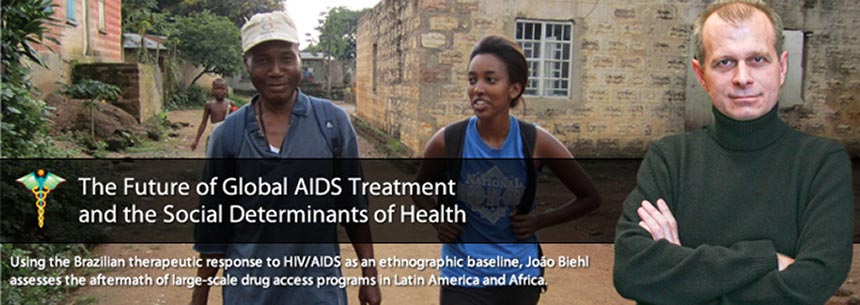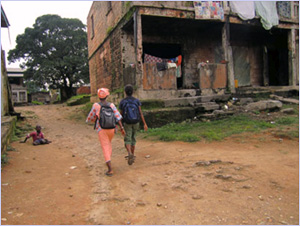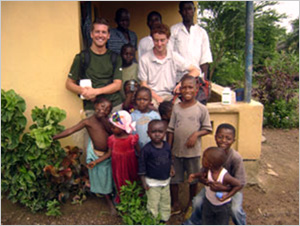The Future of Global AIDS Treatment and the Social Determinants of Health

2007-12 New Investigator Award
Currently, many public- and private-sector initiatives are being launched worldwide that seek to address HIV/AIDS in places where treatments have been scarcely available. João Biehl’s interdisciplinary research team has used the Brazilian therapeutic response to AIDS as an ethnographic baseline from which to assess the aftermath of large-scale drug access programs. Their core objectives are to:
- Identify high-quality human data that can demonstrate both the possibilities and limitations of technology-centered paradigms;
- Illuminate social, “grassroots” forms of innovation in healthcare;
- Develop more nuanced, interdisciplinary approaches to multidimensional health problems; and
- Reflect on the role of the social sciences in evidence-making and advocacy in global health.
External funding from the Ford Foundation has supported expansion of the project.
Educational Impacts


The project fosters partnerships with local initiatives — academic, activist, medical, governmental — and has generated extraordinary independent student field research and summer internships in places such as Guatemala; Uganda; South Africa; Tanzania; Sierra Leone; Brazil; Ecuador; Mexico; and El Paso, Texas.
In addition to providing field-based research experience, the project has trained students through multiple workshops on ethics, research design, and qualitative methods. Upon return to campus, students participated in workshops, sharing their experiences and critically reflecting on their findings.
Since the project’s inception, participating undergraduate students have produced 14 senior theses and nine junior papers, and a graduate student completed his doctoral dissertation. Graduate students and undergraduate students also published articles in academic and media outlets. Postdoctoral researchers have conducted and coordinated field research in Bosnia, Sierra Leone, and Mozambique and have written academic articles and manuscripts.
Other Outcomes


Biehl has also written several academic articles and book chapters. His co-edited volume, When People Come First: Evidence, Actuality, and Theory in Global Health, is forthcoming. Materials and insights generated by this project also influenced Biehl’s “Medical Anthropology” course and significantly informed his course, “Critical Perspectives in Global Health and Health Policy,” required for the certificate in Global Health and Health Policy and cross-listed with Anthropology and the Woodrow Wilson School.
Graduate students Ari Samsky and Amy-Moran Thomas received awards from the American Anthropological Society for papers based on Grand Challenges funded research. Students received the Adel Mahmoud Global Health Scholarship, Fulbright Postgraduate Fellowships, and a Wenner-Gren Foundation’s Graduate Research Fellowship. The Woodrow Wilson School provided support for a postdoctoral fellow in Medical Anthropology and Global Health. Biehl received a Ford Foundation Research Grant ($200,000) for the multi-sited and collaborative project “Demanding the Right to Health in Courts: AIDS Treatment Access, Drug Markets, and Citizenship in Brazil Today.” This project produced novel qualitative and quantitative evidence of the right-to-health litigation, particularly in the southern Brazilian state of Rio Grande do Sul.
Biehl’s team held four international seminars on The Future of Global AIDS Treatment, Treatment Access and Human Rights, Anthropology in the Field of Global Health, Food, Rights, Medicine, and co-organized an international conference on The Judiciary and the Right to Health.
In spring 2011, the research team organized an exhibit at the Bernstein Gallery, Woodrow Wilson School, featuring Retrospect, a show by South African photo-documentarian, Damien Schumann, and The Arts in Global Health, by Princeton student working on global health issues. They also convened several discussion groups with leading experts and co-sponsored the Global Health Colloquium (Program in Global Health and Health Policy).
Future Directions:
Biehl’s research team will continue to chronicle the rapidly changing reality of global AIDS treatment and prevention and how it dovetails with the shifting priorities of global health initiatives and human rights struggles, specifically in Latin America and Africa. The pedagogy of the project has been very successful and they will continue to hold workshops to analyze and reflect critically on their materials. Based on their field projects, students will continue to produce junior papers, senior theses, and doctoral dissertations and they also hope to develop people-centered case studies that will be disseminated to the academic community and wider public.
Participating Department
- Anthropology
- Ecology and Evolutionary Biology
- Molecular Biology
- Near Eastern Studies
- Operations Research and Financial Engineering
- Religion
- Woodrow Wilson School
- Program in Global Health and Health Policy (GHP)
Related Media and Press Coverage
- Crossing Boundaries to Confront Global Problems
- Biehl’s website: www.joaobiehl.net
- Biehl explores consequences of Brazil’s constitutional right to health
- Final Report: “The Future of Global AIDS Treatment and the Social Determinants of Health: Health Grand Challenges: 2008-2012”
Participants
Research Associates
- Peter Locke
- Ramah McKay
Graduate Students
- Celeste Alexander
- Amy Moran-Thomas
- Sebastian Ramirez
- Ari Samsky
- Mariana Socal
Undergraduate Students
- Kathryn Bailey ‘10
- Adam Bradlow ’11
- Christine Blauvelt ’12
- Angelina Caruso ‘12
- Elizabeth Chen ’10
- Courtney Crumpler ‘13
- Allison Daminger ’12
- Ana Duarte-Silva Barry ’12
- Sarina Dutta ‘11
- Raphael Frankfurter ‘13
- Joshua Franklin ‘11
- Alex Gertner ‘10
- Moses Icyishaka ’13
- Kulani Jalata ‘12
- Jessica Lander ‘10
- Tolu Lanrewaju ‘09
- David Laslett ‘09
- Karen Lillie ‘09
- Chao Long ’13
- Raaj Mehta ‘10
- Josephine Yolisa Nalule ‘10
- Benjamin Oseroff ‘11
- Caroline Pinke ’12
- Sonia Porter ‘11
- Olaf Sakkers ‘11
- John Torrey ‘11
- Alan Utria ’12
- Alyse Wheelock ‘11
- Sojung Yi ’12




